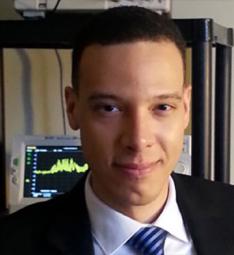From the time John Suarez *12 was in junior high school, he was determined to become an engineer. There was one minor setback in his plan, however: “I was not a strong performer in math and science — those were actually my weaker subjects,” Suarez said.
Despite the fact that he got more B’s than A’s in science and math, Suarez remembers being fascinated by the subjects in elementary school — especially after his family got a Nintendo game console. He vividly remembers asking his father why the game system needed to be connected to the television and was amazed after his father explained that the Nintendo could convert the picture and sound into electricity before sending it to the television.
“I was in fourth grade and this was the most awesome thing I had ever heard in my life,” Suarez said. “And it really stuck with me. Twenty years later, I’m [an electrical engineer], and it’s really due to those kinds of conversations.”
Suarez buckled down in high school, spending most afternoons either studying formulas or teaching math and science concepts to other students as part of his job as a tutor. Suarez would later win two Excellence in Teaching awards during his time as a preceptor at Princeton; he credits his experience as a high school tutor as instrumental in not only solidifying his understanding of math and science but also sparking his interest in helping others, which he has carried with him throughout his life.
After earning a bachelor’s degree in mathematics from City College of New York and a master’s in electrical engineering from Rensselaer Polytechnic Institute, Suarez headed to Princeton to start his Ph.D. He credits Princeton with providing him tremendous learning opportunities and resources, allowing him to spend countless hours experimenting at his workstation in Professor Paul Prucnal’s lab, where he worked with state-of-the-art photonic tools.
Prucnal secured funding to collaborate on a project with engineers at Fort Monmouth, a former installation of the Department of the Army located about an hour from Princeton, and Suarez began travelling there several times a week. He ran conducted research there for his dissertation and was offered an Army research-engineer job a couple years later.
Today, Suarez performs research for technology that will enable U.S. soldiers to communicate better. He works on the hardware side of things, designing electronics for radio and optical systems that are compact, lightweight, and portable.
Last month, he was honored with the U.S. Department of the Army Commander’s Award for Civilian Service, recognizing the quality work he has done for the Army — and for his volunteer work mentoring teenagers and young adults interested in pursuing careers in STEM.
During the last several years, Suarez has traveled back to New York to help students at City College with undergraduate research projects. He’s also volunteered at conferences for high school students in the Washington, D.C., area, talking to students about STEM careers. He has served as a judge at the Junior Science and Humanities Symposium, where high school students present research and projects to compete for scholarships for college. And he’s worked with the Boy and Girl Scouts, conducting demonstrations at STEM in Scouting Day and speaking with the scouts about working in STEM. Last year, he was recognized as a 2015 STEM Military/Civilian Hero for his commitment to “protecting the warfighter and promoting education and outreach” during the annual Hispanic Engineers National Achievement Awards Conference.
“The most important thing that I hope [young adults take away] is that if you really set goals, you can achieve them,” Suarez said. “And a big reason why I’m able to [be successful] is because I had some good teachers myself back in the day, so I think it’s important to give back.”

